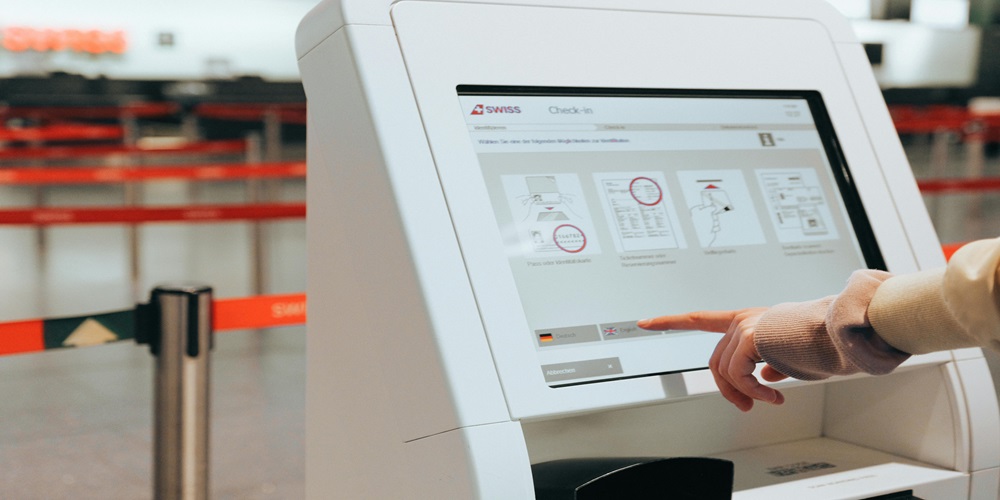The Benefits of Biometric Boarding Passes for Airlines and Passengers

Air travel can be a stressful experience, from long security lines to the fear of missing your flight. But what if we told you there was a way to streamline the boarding process and make flying more efficient for both airlines and passengers? Enter biometric boarding passes – the futuristic solution that is revolutionizing air travel. In this blog post, we will explore the benefits of using biometric technology for boarding passes and how it is changing the game for travelers worldwide. Join us as we take off into a new era of stress-free flying!
Biometric boarding passes are a recent innovation in the aviation industry that use biometric technology to expedite and enhance the boarding process for both airlines and passengers. Instead of traditional paper or electronic boarding passes, biometric boarding passes utilize unique physical characteristics, such as fingerprints or facial recognition, to validate a traveler’s identity.
One of the main benefits of biometric boarding passes is increased efficiency. With traditional methods, passengers have to present their boarding pass multiple times during the check-in and boarding process – at security checkpoints, when checking in luggage, and before entering the aircraft. This can lead to long lines and delays, especially during peak travel seasons. Biometric technology eliminates this repetitive step by replacing it with one comprehensive identification system linked to an individual’s unique biometric data.
Moreover, many airports around the world have implemented automated gates equipped with biometric scanners which allow passengers to simply scan their face or fingerprint upon arrival at airport security. This not only speeds up the process but also eliminates human error that may occur during manual document checks. As a result, airlines can reduce waiting times and increase overall customer satisfaction.
In addition to improving efficiency, biometric boarding passes also offer enhanced security measures for airlines and passengers alike. By using highly accurate personalized identification techniques that cannot be duplicated or forged easily, these advanced systems prevent fraudulent attempts such as identity theft or ticket swapping. Additionally, a passenger’s biometric data remains encrypted throughout the entire process – from check-in to arrival – ensuring privacy protection.
Another advantage of using biometrics in air travel is convenience for travelers. With just one scan of their face or fingerprint at designated checkpoints throughout their journey – such as self-service kiosks or gateways – travelers no longer need to worry about managing multiple physical documents like paper tickets or passports while juggling carry-on luggage.
Implementing this cutting-edge technology ultimately leads towards creating a seamless travel experience for all parties involved – passengers feel more secure knowing their identity is being verified accurately, while airlines benefit from reduced wait times and increased efficiency in airport operations. As the demand for air travel continues to grow, biometric boarding passes are proving to be a valuable tool for the aviation industry in meeting the needs of both airlines and passengers.
The History of Biometric Technology in Air Travel
The history of biometric technology in air travel traces back to the early 2000s when airports began exploring ways to enhance security measures. Biometrics, such as fingerprint scanning and facial recognition, offered a promising solution to verify passengers’ identities efficiently.
Initially, biometric systems were piloted in select airports around the world to test their effectiveness in streamlining boarding processes and improving security checks. As technology advanced, more airlines and airports started implementing biometric solutions on a larger scale.
Over time, biometric boarding passes became increasingly popular for their ability to reduce queues at checkpoints and provide a seamless travel experience for passengers. By securely linking travelers’ identities with their boarding information, biometrics revolutionized the way people navigate through airport terminals.
How Do Biometric Boarding Passes Work?
Biometric boarding passes work by utilizing unique physical characteristics of individuals, such as fingerprints, facial recognition, or iris scans. These biometric data points are securely stored in a database and linked to the passenger’s travel information.
When a passenger arrives at the airport, they simply provide their biometric data at designated checkpoints. The system then matches this information with the stored data to verify the traveler’s identity and flight details.
This streamlined process eliminates the need for physical boarding passes or ID checks, allowing for a seamless and efficient boarding experience. Additionally, biometrics enhance security measures by ensuring that only authorized passengers can access restricted areas within the airport.
Benefits for Airlines and Airport Security
Biometric boarding passes offer a range of benefits for airlines and airport security. By utilizing biometric technology, airports can enhance their security measures significantly. This advanced system allows for more accurate passenger identification, reducing the risk of unauthorized access to restricted areas.
Airlines benefit from streamlined boarding processes, leading to faster turnaround times between flights. With biometric boarding passes, airlines can improve operational efficiency by simplifying passenger verification procedures. This results in smoother and more efficient boarding experiences for both passengers and airline staff.
Moreover, biometrics help airports combat issues such as identity fraud and ticket swapping. By implementing biometric solutions, airports can strengthen their overall security protocols while enhancing the travel experience for passengers. Embracing this innovative technology is crucial in ensuring a safe and secure environment within airport facilities.
Benefits for Passengers
Passengers stand to gain a multitude of benefits from the adoption of biometric boarding passes in air travel. One significant advantage is the convenience and time-saving aspect it offers. With biometrics, passengers can breeze through airport processes seamlessly, reducing wait times and eliminating the need for physical documents.
Enhanced security measures with biometric technology also provide passengers with peace of mind during their journey. Biometric data is unique to each individual, offering an added layer of protection against identity fraud and unauthorized access.
In today’s context, where health and safety are paramount, biometric boarding passes enable contactless travel experiences that minimize physical interactions at various touchpoints within airports. This not only enhances passenger comfort but also contributes to overall hygiene standards amid the COVID-19 pandemic.
Looking ahead, the future possibilities with biometrics in air travel are promising. Passengers can anticipate even more personalized and efficient services tailored to their preferences as airlines continue to innovate and integrate this advanced technology into their operations.
– Convenience and Time-Saving
Imagine breezing through the airport without having to fumble for a paper boarding pass or ID. Biometric boarding passes make this scenario a reality by streamlining the entire process.
With biometrics, passengers can simply scan their fingerprint or face at various checkpoints, allowing for a seamless and efficient boarding experience. This eliminates the need to constantly search for physical documents, ultimately saving precious time.
No more long lines or delays as biometric technology speeds up security checks and boarding procedures. Passengers can swiftly move through each stage with ease, reducing stress and enhancing overall travel convenience.
Forget about rummaging through bags or pockets to find your ticket – biometric passes provide quick access with just a touch or glance. This modern approach not only simplifies air travel but also adds a touch of futuristic flair to the journey ahead.
– Enhanced Security and Privacy Protection
Biometric boarding passes offer enhanced security and privacy protection for both airlines and passengers alike. By utilizing unique physical characteristics such as fingerprints or facial recognition, biometric technology ensures that only authorized individuals can access sensitive boarding information.
This advanced level of security significantly reduces the risk of identity fraud and unauthorized access to boarding passes, enhancing overall safety measures within the aviation industry. Additionally, biometric data is securely encrypted and stored, providing an extra layer of protection against potential breaches or cyber threats.
Furthermore, passengers can feel confident knowing that their personal information is safeguarded through biometric authentication processes. This added privacy protection gives travelers peace of mind throughout their journey, knowing that their data remains confidential and secure.
– Contactless Travel during the COVID-19 Pandemic
As the world navigates through the challenges posed by the COVID-19 pandemic, contactless solutions have become increasingly vital in various industries. In the realm of air travel, biometric boarding passes offer a seamless and touch-free experience for passengers.
By utilizing biometric technology, travelers can move through airports with minimal physical interaction, reducing potential points of contact and enhancing overall safety measures. This not only streamlines the boarding process but also contributes to a more hygienic environment for both passengers and airline staff.
Contactless travel with biometric boarding passes minimizes the need for handling paper documents or touching shared surfaces, promoting a more sanitary journey from check-in to boarding gates. Additionally, this innovative approach aligns with health guidelines during these unprecedented times, offering an added layer of protection against virus transmission.
Incorporating biometric solutions into air travel not only addresses immediate concerns related to COVID-19 but also sets a precedent for future advancements in passenger convenience and safety within the aviation industry.
– Future Possibilities with Biometrics in Air Travel
The future of biometrics in air travel holds exciting possibilities that go beyond just boarding passes. Imagine a seamless journey from check-in to baggage claim, all authenticated through your unique biometric data.
With advancements in technology, passengers may soon be able to breeze through security checkpoints without the need for physical documents or even boarding passes. Biometric identifiers like facial recognition could revolutionize the way we travel by streamlining processes and enhancing security measures.
Moreover, personalized experiences tailored to individual preferences could become the norm with biometric data enabling airlines to offer customized services based on passenger profiles. From expedited boarding procedures to targeted offers, the integration of biometrics opens up a world of convenience and efficiency for travelers worldwide.
Common Concerns and Potential Solutions
Common concerns surrounding biometric boarding passes often revolve around privacy and data security. Passengers may worry about the possibility of their personal information being compromised or misused. To address this, airlines and airport authorities must prioritize robust encryption measures to safeguard sensitive data.
Another concern is the potential for technical glitches or system failures that could disrupt the boarding process. To mitigate this risk, thorough testing and maintenance protocols need to be in place to ensure seamless operation of biometric systems at all times.
Additionally, some passengers may express apprehension about the reliability of biometric technology itself, fearing errors in identification leading to delays or complications during boarding. Continued advancements in biometric algorithms and sensors are key to improving accuracy and minimizing such incidents.
By acknowledging these common concerns and implementing proactive solutions, airlines can instill confidence among passengers regarding the use of biometric boarding passes while enhancing overall travel experience.
Implementation and Adoption
As biometric technology continues to advance, more airlines and airports are embracing the benefits of biometric boarding passes. The implementation of such systems not only streamlines the boarding process but also enhances security measures and improves the overall travel experience for passengers.
With increased adoption of biometric boarding passes, travelers can expect a future where seamless, contactless air travel becomes the norm. From facial recognition to fingerprint scanning, these innovations offer a glimpse into the possibilities of a more efficient and secure aviation industry.
Conclusion
As technology continues to advance, biometric boarding passes have become a game-changing innovation for both airlines and passengers. With increased security, efficiency, and convenience, it’s clear that the benefits of using biometrics far outweigh any potential concerns. We can expect to see more widespread implementation of this technology in the future as air travel becomes faster and smoother for everyone involved. So next time you’re at the airport, embrace the ease of using your fingerprint or facial recognition to board your flight – it’s just one small step towards a more seamless travel experience.





